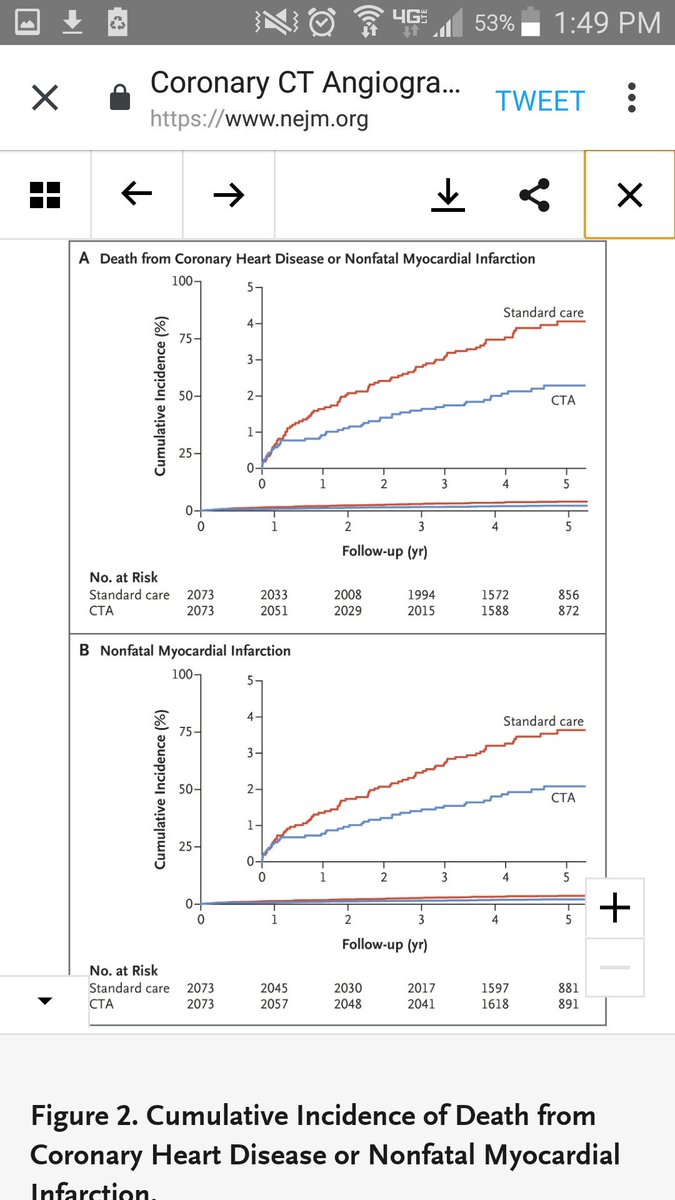1| Good #cardiotwitter on #SCOTHeart. Others have tweeted reasons y believable. Here is my reply tweetorial
@khurramn1 @AChoiHeart @MarcDweck @JWeirMcCall @rwyeh @drjohnm @venkmurthy @DavidLBrownMD @RogueRad
#ESCCongress
Linking my original tweetorial:
@khurramn1 @AChoiHeart @MarcDweck @JWeirMcCall @rwyeh @drjohnm @venkmurthy @DavidLBrownMD @RogueRad
#ESCCongress
Linking my original tweetorial:
https://twitter.com/AnilMakam/status/1033435523736645635
2| Let's start with MI def. Billing codes less accurate than adjudicated MI outcomes, yes? Could be nondiff misclassification which bias to null. But could also be diff w/ ascertainment bias (look harder, anchoring) knowing CCTA result, since 2/3rds normal or nonobstruct. 

3| It is conjecture. But basis of clinical reasoning is to factor in test results. The posterior probability for this theory moves up much higher when we try to figure out by what mechanism did a diagnostic testing strategy lead to better outcomes, since the radiation did zilch
4| So how did CCTA-first strategy lead to fewer MIs? Proponents think more targeted/appropriate preventive medical therapy & led to behavior change. Let's start with first one, preventive medical therapy
5| For targeted therapy to work to prevent MI, ALL benefits must comes from starting tx in those not on it before. While STOPPING inappropriate meds is a good outcome in and of itself, doesn't lead to fewer MIs. Even @DavidLBrownMD & @RFRedberg wouldn't claim #statins CAUSE MIs
6| So how many more started therapy in CCTA arm? Since group sizes same, I will use raw numbers. 97 more in CCTA started medical tx & 29 avoided an MI. That's a ginormous effect size (NNT~3)! Others say its not about delta, since CCTA is targeted to patients who need it. So... 

7| ...follow this absurdist thought experiment: all patients started on medical therapy in CCTA arm were APPROPRIATE and all patients in control group were INAPPROPRIATE. Diff now becomes 402 patients between arms. So what's the effect size now?
8| For low risk population (stable CP seen in outpt cards clinic with 2/3rds having no or nonobstruct CAD), we left to believe preventive medical therapy has an absolute risk reduction of 7.2% (29 fewer MIs/402 people commencing therapy), with a 5-year NNT of 14!!
9| For those playing at home, Aspirin after STEMI has NNT of ~40s to prevent death. This is wishful thinking at best that more targeted preventive medical therapy is this effective
10| But others counter that knowing anatomy/CAD burden prompts behavior change. Dont knowl for CCTA, but for other areas behavior change is HARD (though still a worthy pursuit!)
If preventive cardiology has unlocked this mystery, here is my plea:
End
If preventive cardiology has unlocked this mystery, here is my plea:
https://twitter.com/AnilMakam/status/1033880891842547712
End
11| Lied. Last one. What was presented in study appeared well done. But if investigators think pathway to better outcomes r more appropriate medical therapy & behavior change, PLEASE STUDY these. Even surrogate markers (surveys on intention to change behavior) would be helpful
• • •
Missing some Tweet in this thread? You can try to
force a refresh





